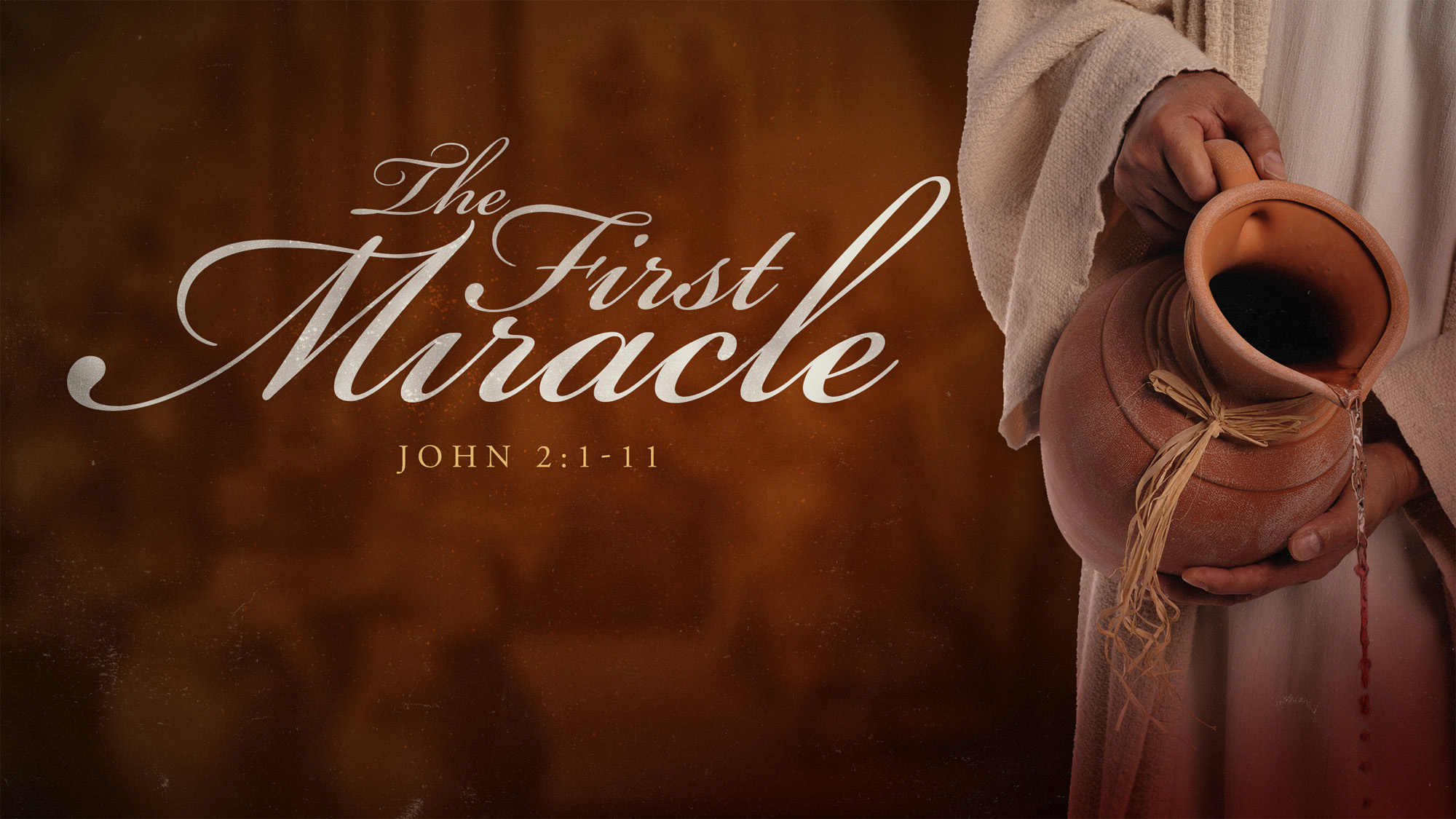The Wedding in Cana
This morning we are looking at an event which took place early on in the public life of Jesus. This event is recorded in the second chapter of the gospel of John.
Background
Before we see what takes place in this event, we need to first stop and get our bearings. John was perhaps the closest personal friend of Jesus. He is the author of one of the four New Testament gospels (the others are Matthew, Mark, and Luke).
What are the gospels and why were they written?
- They record important historical events in the life of Jesus.
- However, they are not simply history books—they are written accounts of Jesus life intended to personally introduce us to Jesus.
- They allow us to see and meet him.
- The expose us to the day to day life of Jesus on the earth.
- We meet Jesus in a variety of different circumstances, and we can see how he acts and reacts.
But this isn’t the whole story…
- The gospels also interpret for us the significance of the events which they record.
- In other words, the gospel writers are helping you and I to come to the right conclusions from what we have read.
- They make us aware, in no uncertain terms, that they are trying to convince you and I of something.
- And they rely on the real life events in Jesus’s ministry to prove their point.
“since I myself have carefully investigated everything from the beginning, I too decided to write an orderly account for you, most excellent Theophilus, so that you may know the certainty of the things you have been taught” (Luke 1:3–4)
Like the other gospel writers, John is seeking to help us understand who Jesus is.
Because there is simply so much that he could have recorded, John carefully selected special acts which Jesus did and events in his lifetime.
“Jesus performed many other signs in the presence of his disciples, which are not recorded in this book” (John 20:30)
“Jesus did many other things as well. If every one of them were written down, I suppose that even the whole world would not have room for the books that would be written” (John 21:25)
John adapted these various scenes from the earthly life of Jesus to demonstrate a point. As we will see, this event in the life of Jesus illustrates an important point toward which the whole gospel of John is moving.
John carefully arranged his record of these events to lead the reader to a true understanding of who Jesus is.
That leads us to ask about what John is trying to convince us of in his gospel.
- What is John trying to tell us?
- John tells us that Jesus Christ is eternal, uncreated, and shares the same divine nature that the God of Heaven has.
- He tells us that Jesus is the one we must believe on in order to receive eternal life.
- These are extraordinary claims for anyone to make about anyone.
- We should naturally hear such claims with a sense of disbelief.
- If we are not astounded by these claims, we haven’t really been listening.
Let’s turn to the story to see what we can learn about Jesus from the account.
The Story
The Setting—A Wedding Reception (John 2:1–2)
In this account, we meet Jesus in a setting highly cultural, but at the same time, a setting common to every culture. The wedding was held in a small village called Cana. In that culture, wedding festivities could last up to a week.
The Problem—The Wine Runs Out (John 2:3–5)
The financial responsibility for the wedding celebration seems to be on the shoulders of the groom and his parents. Running out of wine at a wedding celebration would have brought shame upon the family. The groom’s parents would have looked like poor hosts. The groom would not appear to be the provider that he was supposed to be for his new wife.
Mary, Jesus’s mother, approaches him to see if he would resolve the problem. Mary comes to Jesus—her concern seems to hint at a close relationship with the family. Mary’s Request—what exactly did she expect him to do?
She was probably not expecting him to perform a miracle.
At this point, many suspect that Mary is a widow and has come to rely upon Jesus, her oldest son.
If this is the case, she is probably seeking to enlist his help to resolve the problem at hand.
At the same time, Mary is aware that she conceived Jesus as a virgin and that he is the Son of God. Perhaps this might have been in the back of her mind as she seeks his help.
Jesus replies to his mother. His answer is one of gentle resistance:
“Woman”—respectful but not endearing
“Why do you involve me?” NIV
“My hour”—referring to his death on the Cross and the glory that followed.
Jesus gently and graciously helps his mother see that his primary mission and motivation is to do the things that God, his Father has for him to do.
“Now that he had entered into the purpose of his coming, everything, even family ties, had to be subordinated to his divine mission” (D. A. Carson, The Gospel According to John, p. 171)
Mary shows her confidence in Jesus by leaving the servants under his direction (v. 5)
The Miracle—Jesus Turns Water Into Wine (John 2:6–10)
Jesus’s Instruction to the Servants (vv. 6–8)
The capacity of the water jars—between 75 and 115 liters (x6) = up to about 690 liters. Did the wine come from the filled jars or did the servants draw fresh water that Jesus then turned into wine?
The Response of the head waiter (vv. 9–10)
The Outcome—Jesus’s Glory Was Revealed and People Believed (John 2:11)
Some Reflection Questions:
If Jesus really is who he claimed to be, why didn’t he just get the attention of the whole world and perform miracles that everyone could see? Why didn’t he just impress everyone and clear up any doubt about who he really was?
The answer is that Jesus didn’t come to make a show of himself or to lift himself up in everyone’s eyes. In fact, several hundred years beforehand, a prophet named Isaiah foretold the humility and gentleness that would define Jesus:
“He will not cry aloud or lift up his voice, or make it heard in the street; a bruised reed he will not break, and a faintly burning wick he will not quench” (Isaiah 42:2–3).
Does Jesus’s act show us that it’s okay to get drunk?
This account of Jesus’s miraculous act of turning water into wine doesn’t really address the morality of drunkenness; however, in a number of other places (especially Ephesians 5:18) the Scriptures condemn the sin of drunkenness. At the same time, it’s pretty clear that Jesus’s miracle was a sign of his power intended for those who were hearing and observing him (e.g., the servants). There was obviously some level of intoxication among the guests (2:10), though how much is impossible to tell from this account. Yet most in the wedding crowd were completely oblivious to the majesty of the Creator who was in their presence.
If John is right that there are countless other miracles that Jesus did, why did he choose to record this one?
The reason why John recorded Jesus miracle at the wedding in Cana was to validate something which he said earlier. In the prologue, John claimed that Jesus Christ is the Creator, that all things were made by him (1:3). He tells us Jesus Christ is the Word—the uncreated eternal God who pitched his tent of human flesh in our very presence (1:14). John preserves for us an account of Jesus demonstrating his power over creation and his power to create. If Jesus is who he claims, we can expect him to have such power as he demonstrated at Cana. John records the miracles he does with the intention of compelling us to believe in Jesus:
“these are written that you may believe that Jesus is the Messiah, the Son of God, and that by believing you may have life in his name.” (John 20:31)
Application Questions
This event compels us to make a personal decision about Jesus.
John recounts that the disciples saw the miracle Jesus did and believed in him. What about you? What was your heart’s response to this account?
Perhaps you have already believed in Jesus. If so, how does this story speak your own needs and Jesus’s ability to answer them? This passage shows that for those who have believed in Jesus, he is able to meet the greatest of your needs when you seek his grace.
You can download The Wedding at Cana study notes here.

